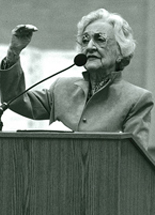SSA Centennial Celebration
Profiles of Distinction Series
Helen Harris Perlman
Samuel Deutsch Distinguished Service Professor
Lingering prejudice and discrimination set Helen Harris Perlman on a course to become one of the most influential people in social services in her era. Ms. Perlman graduated from the University of Minnesota in 1926 with high honors and an A.B. in English literature. Advised that, as a Jew, she would never find an appointment as a professor in the humanities, she took a job as a summer caseworker for the Chicago Jewish Social Service Bureau.
“A whole world opened up to me,” she recalled. “I had no idea of the kinds of trouble people had. I got a great deal of satisfaction from being able to help people. I found that in many cases, families faced the same kinds of problems and conflicts that one encountered in the great works of literature.”
She began her career in social work in at a particularly advantageous time. There was, she said, “a sudden flood of psychological knowledge.” In 1933, she received one of four Commonwealth Fund scholarships for students at the New York School of Social Work, now a part of Columbia University.
As she finished her studies in New York, she worked as a caseworker, lecturer, and clinical instructor at the New York School of Social Work, Columbia University, and the Bureau of Child Guidance. It was through this range of experience that she began to develop the conceptual framework for direct-work practice. She earned her master’s degree in social work from Columbia University in 1943.
Shortly after joining the SSA faculty in 1945, she began working on Social Casework: A Problem-solving Process. The book, originally published in 1957, has sold nearly 200,000 copies and has been translated into more than ten languages. Ms. Perlman’s work, together with later work by her colleagues, established the “Chicago School” approach to problem-solving, which is still applied in practice today.
Ms. Perlman’s theories stood apart from the leading theories of the day, which typically focused on long-term psychotherapy. She argued that in-depth study wasn’t always necessary and could even impede progress.
The core idea of her approach was that success could be achieved by partializing – or separating into manageable segments - a client’s intertwined problems and focusing on one specific issue the client and social worker agreed needed to be resolved at a given time. “An important feature of partialization,” Ms. Perlman said, “is the fact that the problem-solving process was transferable to other areas of life’s difficulties.”
Ms. Perlman continued to break new ground in social work, writing more than 75 articles and seven other books, including So You Want to Be a Social Worker, Persona: Social Role and Personality and Relationship: The Heart of Helping People, and a memoir entitled Dancing Clock & Other Childhood Memories. She also edited the book Helping: Charlotte Towle on Social Casework. She also kept up with her love of writing fiction, publishing poetry and stories in newspapers and magazines, including the short story “Twelfth Summer,” published in the 1950s in the New Yorker.
Ms. Perlman was active in many professional and educational circles throughout her career, serving for many years on the editorial board of the Journal of American Orthopsychiatry. The society recognized her service with a life membership. She also served on the editorial board of Social Work, the major publication of the National Association of Social Workers (NASW) and on the curriculum development committee of the Council on Social Work Education (CSWE). CSWE named her a Pioneer of Social Work Education. She received honorary degrees from Boston University, the University of Central Florida, and her alma mater, the University of Minnesota.
Many of her highest accolades came from the University of Chicago. She was the first woman and the first SSA faculty member to be named a Distinguished Service Professor by the University in 1969. In 1996, SSA established the Helen Harris Perlman Visiting Professorship in the School of Social Service Administration in honor of her numerous scholarly contributions.
Ms. Perlman was also the first woman elected to the Quadrangle Club Board, the first woman appointed to the Library Board, and, in January, 1970, the first woman to address the annual meeting of the Board of Trustees and faculty.
